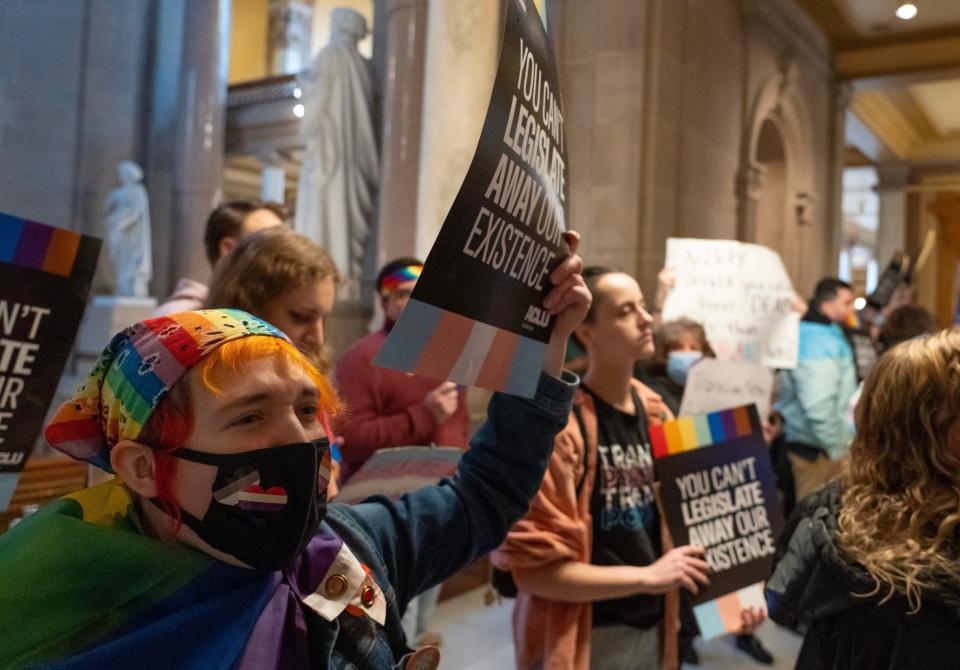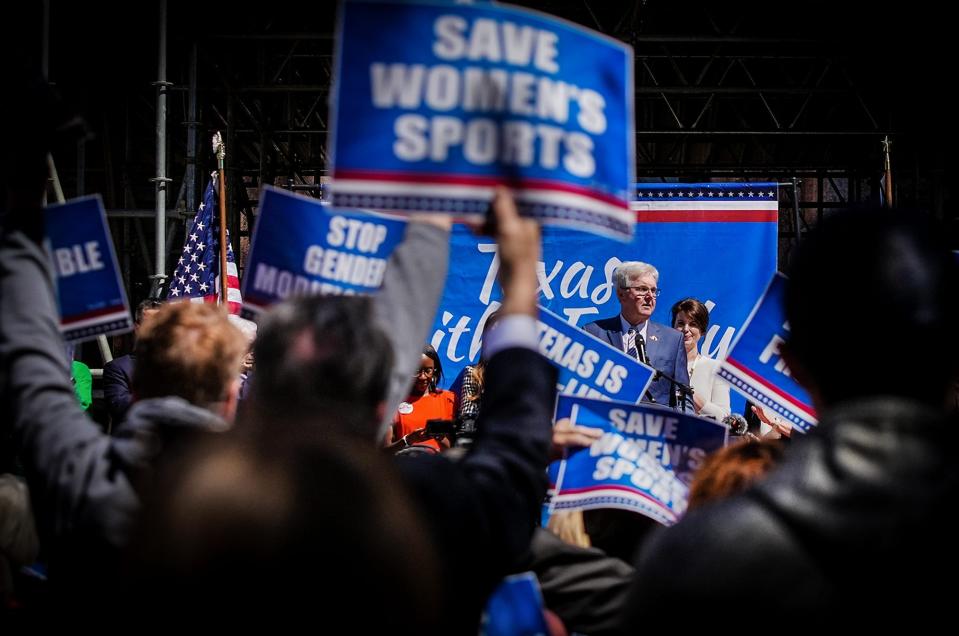Supreme Court, in an emergency order, lets Idaho enforce ban on transgender care
WASHINGTON – The Supreme Court on Monday said Idaho can enforce a law banning gender transition care for minors, stepping into the debate over an issue that has divided lower courts.
The court did so over the objections of the three liberal justices.
It’s the first case about restrictions on puberty blockers and hormone therapy for transgender people under age 18 that the court has acted on. But it does not get to the underlying legal questions of the ban itself, an issue that has divided lower federal courts and is part of a wave of conservative legislation and litigation aimed at transgender Americans.
Justice Kentanji Brown Jackson, writing for herself and Justice Sonya Sotomayor, criticized the majority for granting Idaho’s request through its “emergency” route, rather than letting it proceed through the regular channels.
“This Court is not compelled to rise and respond every time an applicant rushes to us with an alleged emergency, and it is especially important for us to refrain from doing so in novel, highly charged, and unsettled circumstances,” Jackson wrote.
But Justice Neil Gorsuch, joined by Justices Samuel Alito and Clarence Thomas, said the district court went further than it should have when it blocked the state from enforcing any aspect of the law while it’s being litigated. That decision threatened to suspend the law indefinitely because it can take years to reach final judgment, Gorsuch wrote.
Justice Brett Kavanaugh wrote his own defense of the majority’s order in a concurrence joined by Justice Amy Coney Barrett.
Chief Justice John Roberts did not make his position public.
The court could also decide soon whether it will review such bans in Tennessee and Kentucky. That election-year decision would come as transgender issues have become an increasingly potent political issue.
More: Supreme Court snubs House Republicans who dodged metal detectors in Congress after Jan. 6
Passed last year, Idaho’s law is being challenged by the families of two transgender teenagers.
After lower courts temporarily blocked enforcement, Idaho asked the Supreme Court to let it go into effect with an exception carved out for the challengers.
The American Civil Liberties Union, which is representing the two Idaho families, said that option won't protect the teenagers as medical providers won't want to risk triggering a law that could put them behind bars for a decade. Also, the teens would have to give up their anonymity.
An 'awful result for transgender youth'
The ACLU called the Supreme Court's decision an "awful result for transgender youth and their families across the state."
"Today's ruling allows the state to shut down the care that thousands of families rely on while sowing further confusion and disruption," the group said in a statement.
Praising the court's decision, Idaho Attorney General Raúl Labrador said the law ensures minors will not be subjected to life-altering drugs and procedures.
"Denying the basic truth that boys and girls are biologically different hurts our kids," he said in a statement.
Filed as an emergency request, Idaho’s appeal to the high court is a prelude to the larger pending issue: Whether the justices will uphold such bans, which have proliferated in recent years.
Related: Supreme Court rejects appeal from parents who lost custody of trans teen
Kentucky, Tennessee transgender cases may come next
Families of transgender children have asked the Supreme Court to overturn a ruling by the Cincinnati-based U.S. Court of Appeals for the 6th Circuit allowing Kentucky and Tennessee to ban gender-affirming medical care for minors.
The Justice Department has weighed in on the side of the families, telling the court that its input is “urgently needed” to definitively resolve whether the bans are discriminatory.
“These laws, and the conflicting court decisions about their validity, are creating profound uncertainty for transgender adolescents and their families around the nation,” Solicitor General Elizabeth Prelogar said in a filing.
The court could announce as early as this month if they will hear the appeals.

Combined with other state actions to restrict the bathrooms transgender students can use and what sports teams they can join, the laws are expected to be a major issue in this year’s elections.
Trump says he will push to ban gender-affirming care for minors
Former President Donald Trump, the presumptive GOP nominee, has said he will press Congress to pass a law banning gender-affirming care for minors and will cut federal funding for schools pushing “transgender insanity” if he returns to the White House.
President Joe Biden has boasted about steps he’s taken to strengthen the rights of “transgender and all LGBTQI+ Americans.”
The issue has gained prominence with startling speed, despite the tiny fraction of Americans who are transgender.

2024 elections Republicans lean into anti-trans messaging. But will it mobilize voters?
Since 2022, the number of states taking steps to limit access to gender-affirming care for minors has grown from four to 23, according to the nonpartisan health research organization KFF. Restrictions were fully in effect in 17 states as of January.
That’s despite the fact that most major medical groups support youth access to gender-affirming care.
The American Medical Association has called the state bans a “dangerous intrusion of government into the practice of medicine and the criminalization of health care decision-making.”
“Gender-affirming care is medically necessary, evidence-based care that improves the physical and mental health of transgender and gender-diverse people,” Dr. Michael Suk, a member of the AMA board, said when the group reinforced its opposition to state bans in 2021.
Depression, anxiety and self-harm
One of the transgender teenage girls challenging Idaho’s law suffered from depression, anxiety and self-harm before starting gender-affirming medical care, according to filings. The mental health of the other teen likewise deteriorated as puberty began.
Their parents have told the courts they’re terrified about the impact on their daughters’ health and lives if they can’t continue treatment.
Biden's evolution Joe Biden helped a movement when he changed his mind on LGBTQ issues. Who advises him now?
Labrador, Idaho's attorney general, argued the law is needed to protect “vulnerable children” from what he called “risky and dangerous medical procedures.”
“Idaho should be able to protect children from experimental medical procedures that cause irreversible and life-long harms,” Labrador wrote in his appeal to the Supreme Court.
Originally scheduled to go into effect in January, Idaho's law was temporarily blocked by a district court judge in Idaho while it’s being litigated. The San Francisco-based U.S. court of Appeals for the 9th Circuit upheld that decision in January.
Despite the litigation swirling around transgender minors, the Supreme Court has largely been silent on the issue. In April, the high court sided with a 12-year-old transgender girl who was challenging a West Virginia ban on transgender athletes joining girls sports teams, temporarily blocking the state from enforcing the prohibition. The ruling came on the court's emergency docket and did not resolve the underlying questions in the case.
In January, the Supreme Court declined to decide whether schools can bar transgender students from using a bathroom that reflects their gender identity, leaving in place a lower court ruling that allowed a transgender middle school boy in Indiana to use the boys' bathroom.
This article originally appeared on USA TODAY: Supreme Court lets Idaho enforce ban on transgender care
